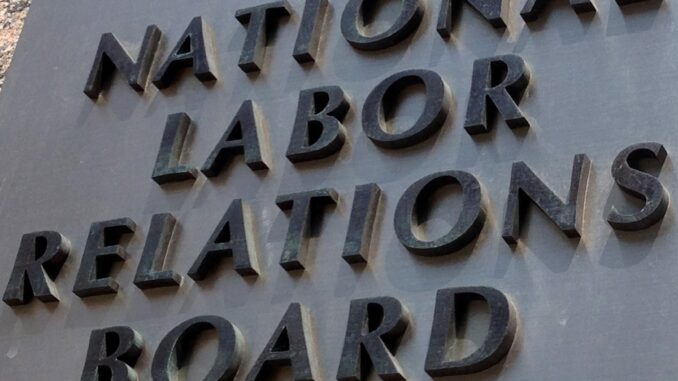
by Rob Callahan
What makes you a Guild member? Is it principally about a transaction, the remittance of quarterly payments for membership? Or is it about your relationship to your colleagues, your shared commitment to the post-production community’s mutual interests? In other words, do we conceive of union membership in terms of dues or in terms of duties? How we collectively answer that question may well determine whether we flounder or flourish in the face of concerted attacks upon organized labor.

My admittedly dour column in the last CineMontage addressed the recent spate of successful assaults upon labor waged by proponents of so-called “Right to Work” legislation and policy. To recap, “Right to Work” advocates seek to weaken organized labor by outlawing union security clauses in collective bargaining agreements. Such clauses specify that employees represented by a union will join the union as members or otherwise contribute towards the monetary costs of their representation. “Right to Work” effectively encourages a kind of piracy by incentivizing individuals to reap the benefits of unionization without sharing in any of the expenses. By mandating representation without taxation, “Right to Work” ultimately aims to make collective bargaining untenable.
“Right to Work” and other anti-union laws have had harsh and profound impacts upon the clout of organized labor. In states such as Wisconsin and Michigan, long considered labor strongholds, union membership has dropped precipitously in the aftermath of anti-union laws passed in recent years. And unions’ anemia has a material effect upon employees’ earnings. Studies show that workers in “Right to Work” states earn 12 percent less than their counterparts in other states, controlling for other factors.
My previous column was written in the context of a case then pending before the Supreme Court, Friedrichs vs. the California Teachers Association, in which “Right to Work” advocates were expected to score a dramatic victory. The case concerned union security clauses in public-sector collective bargaining agreements, and a ruling against the teachers’ union would have resulted in “Right to Work” being imposed upon all the nation’s public employees — roughly seven million of whom are currently unionized. All evidence indicated that the Court was prepared to discard decades of precedent and decree public-sector employment “Right to Work.” Although such a decision would of course most immediately and directly affect those working in the public sector, it would also dramatically ratchet up pressure on private-sector employees and their unions in the 24 remaining states in which “Right to Work” is not yet the law of the land.
Since I last addressed this topic in this space, some specific circumstances have changed. Much, however, remains the same.
Justice Antonin Scalia died suddenly of a heart attack on February 12 (coincidentally, the same day that last quarter’s CineMontage was published). Among its other consequences, Scalia’s unexpected passing changed the anticipated outcome of Friedrichs and several other cases that had been predicted to be decided by five-to-four majorities. On March 29, a divided Court, unable to rule conclusively for or against “Right to Work,” affirmed a lower court’s ruling upholding the teachers’ union’s ability to collect fees from represented teachers who opt out of membership. The labor movement, having faced the certainty of a devastating setback, received a surprise reprieve.
One might easily draw the wrong lessons from this sudden reversal of fortune. The plot twist of Scalia’s death has all the hallmarks of a deus ex machina event, in which our protagonists’ fates hinge upon a random, improbable occurrence outside of their control. We’ve seen this scene before: our hero, cornered and helpless, faces certain doom, only to evade his fate when the bad guy’s gun misfires. This version has the labor movement eluding looming catastrophe thanks to a septuagenarian jurist’s poor cardiovascular health, but the trope is structurally familiar from any number of action movies; the imperiled good guy catches a lucky break at the last minute.
Such a telling of this story, though, gets it wrong on two counts. Firstly, this narrative suggests that we in the labor movement have escaped catastrophe, when, in fact, we may have only postponed it. Secondly, the focus on an effectively random event over which we have no influence (a 79-year-old man’s abrupt heart failure) obscures the broader and more systemic problems that have placed the labor movement in such a precarious position — problems we can and must address if our movement is to withstand future attacks upon collective bargaining.
The push for “Right to Work” policies certainly did not die with Scalia’s passing, and even the Friedrichs case itself may have not been definitively put to rest. Less than two weeks after the deadlocked Court dismissed the case, the plaintiffs in Friedrichs petitioned the Court to rehear their suit after Scalia’s vacancy is filled. The Court rarely grants such rehearings, although the unusual circumstances in this instance suggest such a do-over is not out of the question. Even if the Friedrichs case does not get heard again, though, chances are good that anti-union interests could bring another, substantively similar case before a Court they believe to be sympathetic to their aims. Much will depend upon when and by whom Scalia’s vacancy is filled.
But Friedrichs, however great a threat it posed, represents only one element of “Right to Work” proponents’ multi-pronged attack on labor. Interests antithetical to collective bargaining have already succeeded in making private-sector workplaces “Right to Work” in a majority of the states (West Virginia became the 26th such state in February), and we can expect them to continue to press their case forward at the state and even local level. Labor might have lucked into a little extra time, but we have not yet outlasted the onslaught.
How, then, does labor go beyond this lucky reprieve in the Friedrichs case and take action to defend itself from those committed to eroding collective bargaining rights? We cannot count on random events to forestall our opponents. Nor can we invest all of our hopes in the political process and efforts to elect officials friendly to Labor’s agenda. Friedrichs underscores the importance of having sympathetic leaders in the judicial, executive and legislative branches of government; but ultimately, politicians will not save us.
The only way that we in organized labor can effectively defend ourselves against the threat posed by “Right to Work” is to change the culture of our organizations such that the value of solidarity decisively trumps individuals’ impulse to freeload. To the extent that union members’ relationships to their unions is predicated upon a fee-for-service model — in which members imagine themselves as customers purchasing the service of representation for the price of dues — our organizations will remain vulnerable to those promising to free employees from the obligation of dues. If, on the other hand, a union’s members fully recognize themselves as citizens of their organization, stakeholders whose welfare is bound together with that of their fellow members, the union has little need for union security clauses and, more importantly, it flourishes from the active engagement of members committed to advancing their common interests. Customers chase bargains; citizens commit to values. To return to the questions with which I opened this column, we must foster a culture in which membership is about fulfilling duties rather than merely paying dues.
There is a culture of union citizenship within our organization. I see it when members and non-members alike come together to insist upon union contracts at non-union shops. I see it when members act in concert to signal to their employers that they are united in their contract demands. I see it when members come out to walk picket lines in support of other crews. We saw it dramatically a year and a half ago, when hundreds of members on both coasts rallied as one to successfully call for the reinstatement of a post-production crew that had been illegally fired for organizing. And we see it all the time in less dramatic, more quotidian ways, when members simply recognize their responsibility for having one another’s backs.
While there is a culture of union citizenship in our Guild, that culture needs to be bolstered and grown. Too many of our members — particularly those who have never been directly involved in struggles to improve their (or others’) jobs — regard the union as merely a bureaucratic entity to which they have no real connection save for the quarterly remission of dues. We need to engage those members in the cause of advancing our shared interests. Internal organizing — the work of securing the active participation of those who are already dues-paying members — will prove critical in our preparing ourselves for challenges to the strength of organized labor.
In recent years, members on the union’s Membership Outreach Committee have been working hard to promote the values of union citizenship amongst their peers. They have been advancing the message that a healthy, democratic union isn’t just a team of competent technocrats on a payroll, but an engaged and informed community of colleagues taking ownership of their organization. In the months to come, the Membership Outreach Committee will be working on revitalizing and expanding our existing stewardship structure — the network of grassroots leadership throughout the post-production workplaces where our members work — with a view towards fostering a more dynamic and robust union culture.
If you would like to take part in internal organizing efforts to prepare us for the external threats organized labor faces in the years to come, contact the Membership Outreach Committee or myself to talk about the work we need to do. f






